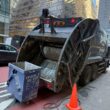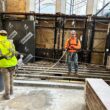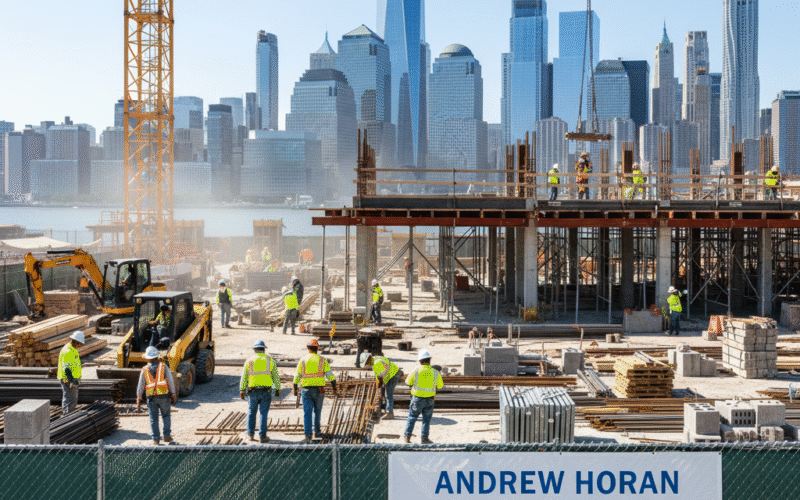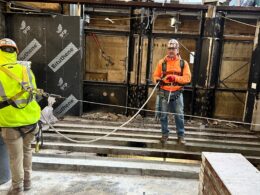The construction and demolition world of New York City is filled with powerful companies, ambitious entrepreneurs, and fierce competition. Among these, one name has stood out in recent years—Andrew Horan Alba. For some, it symbolizes success, growth, and opportunity. For others, it is tied to controversy, lawsuits, and warnings about corporate misconduct.
In this article, we’ll explore the story of Andrew Horan Alba from a different perspective: how it became an influential player in the industry, what fueled its controversies, and how its lessons can guide both workers and business leaders.
Who Is Andrew Horan Alba?
The phrase “Andrew Horan Alba” is most often a combination of two things:
- Andrew Horan – the businessman and founder of Alba Services Inc.
- Alba (Alba Services) – the company he built, which provides demolition, carting, asbestos abatement, and environmental services in New York.
👉 The Org confirms Horan’s role as President of Alba Services.
👉 His LinkedIn profile outlines his leadership background.
Together, “Andrew Horan Alba” has become shorthand for both the man and his enterprise.
Alba Services: Building a Brand
Founded in New York City, Alba Services positioned itself as an all-in-one demolition and environmental contractor. Its services included:
- Full demolition of commercial and residential buildings
- Carting and waste removal
- Asbestos and hazardous material abatement
- Environmental remediation and safety consulting
Over time, Alba grew into a network of affiliated companies: Alba Environmental, Arc Contracting, Caledonia Carting, and others.
👉 For insights into the company’s own branding, see the Alba Services Blog.
How Did Alba Grow So Quickly?
Several factors explain Alba’s growth:
- Real Estate Boom in NYC – demand for demolition rose as developers cleared land for new projects.
- Bundled Services – Alba’s ability to combine demolition, carting, and asbestos removal made it attractive to contractors.
- Competitive Pricing – Alba often undercut rivals to win bids.
- Multiple Corporate Identities – operating through different entities allowed Alba to compete for contracts under different names.
This rapid growth story was also documented in UpdateJungle’s earlier feature.
But with aggressive growth came problems.
The Legal and Ethical Storms
Kickback and Bid Rigging Case
In 2023, the Manhattan District Attorney indicted Alba and other companies in a $5 million construction kickback scheme.
- Alba allegedly secured $2.75 million in contracts tied to the scheme.
- Payments of over $200,000 were made in kickbacks.
- By 2024, Andrew Horan and Alba pled guilty to criminal facilitation.
👉 Coverage via AMNY.
👉 Legal filings from the Manhattan DA (PDF).
Labor and Wage Theft Allegations
Alba has faced multiple class action lawsuits for:
- Failure to pay overtime
- Paying workers off the books
- Retaliating against whistleblowers
- Discriminating against immigrant workers
In 2021, Alba settled a wage theft case for $1.5 million. Additional suits followed in 2023 and 2024.
👉 See watchdog coverage at Local 79’s Alba Exploits.
Safety and OSHA Violations
Alba has also been cited for unsafe practices:
- Workers injured in falls due to lack of safety training (2022).
- An excavator collapse in 2021 during demolition.
- Failure to maintain safety logs and incident reports.
OSHA and city regulators have repeatedly fined the company.
Workers’ Compensation Misclassification
The NYS Workers’ Compensation Board penalized Alba and affiliates for misclassifying asbestos workers as “engineers” to reduce insurance premiums.
- Alba Environmental fined $35,000.
- Caledonia Carting barred from public contracts for one year.
- Judgments of over $1.2 million in unpaid premiums.
Community and Union Backlash
Alba’s reputation has led to petitions, protests, and campaigns urging developers not to hire them.
👉 For example, Action Network hosted a petition against Alba’s involvement in a Brooklyn project.
Labor union Local 79 has accused Alba of exploiting immigrant workers and lowering industry standards.
Why the Story of Andrew Horan Alba Matters
The Andrew Horan Alba story isn’t just about one company. It reveals broader issues in industries like demolition and construction:
- How companies scale quickly in high-demand markets
- How systemic loopholes allow misclassification and wage theft
- The risks of ignoring compliance in dangerous industries
- How reputation and trust are just as valuable as contracts
Lessons for Entrepreneurs and Workers
- Compliance is Essential – misclassification and unsafe practices always catch up.
- Shortcuts Don’t Pay – Alba’s legal troubles outweigh the short-term profits.
- Transparency Builds Trust – hiding safety logs or misusing insurance erodes credibility.
- Workers Deserve Respect – fair pay and safety protect not only employees but also a company’s reputation.
- Reputation is Fragile – once lost, it’s hard to win back.
The Future of Andrew Horan Alba
Despite controversies, Alba continues to operate. Its survival will depend on whether it can:
- Reform business practices
- Prioritize worker rights and safety
- Rebuild trust with regulators and communities
If not, the company risks further lawsuits, bans, and reputational collapse.
Internal Links (UpdateJungle)
- The Growth Story of Andrew Horan Alba Services in New York
- Related idea: “Top Construction Scandals That Shaped New York’s Industry”
- Related idea: “How Worker Misclassification Impacts the Modern Workforce”
External References
Conclusion
The story of Andrew Horan Alba is one of ambition, rapid expansion, and the consequences of neglecting compliance. For entrepreneurs, it’s a reminder that sustainable growth requires not just contracts and profits, but also ethics, safety, and respect for workers.
For workers and communities, it shows the importance of holding corporations accountable. And for regulators, it demonstrates why oversight in industries like demolition is absolutely necessary.
In the end, the name Andrew Horan Alba will remain part of New York’s construction history—both as a symbol of growth and as a warning of what happens when businesses cut corners.





